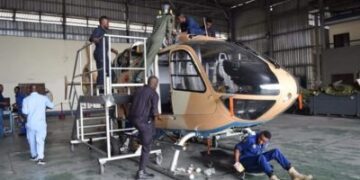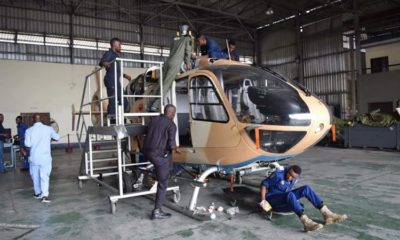![]()
The National Agency for Science and Engineering Infrastructure (NASENI) has announced that engineering work on Nigeria’s first indigenous helicopter is nearing completion, marking a significant step in the country’s aerospace technology development.
This was disclosed by the Project Manager of NASENI’s Aeronautics and Air Vehicle Development Institute, Kaduna, Engr. Kareem Aduagba, during a Focus Group Engagement in Kaduna on Wednesday. The event, which brought together inventors, manufacturers, government officials, and industry leaders, was aimed at promoting local manufacturing, innovation, and the adoption of Made-in-Nigeria products.
Aduagba highlighted the progress made on the project, emphasizing that NASENI’s approach is not about “reinventing the wheel” but building on existing aeronautical advancements.
“What we are doing now is not to reinvent the wheel. We had one of our projects being started from the first principle which we are working on, both the Made-in-Nigeria helicopter and some Unmanned Aerial Vehicles (UAV),” he stated.
He further explained that NASENI has acquired and studied aircraft components in Semi Knock Down (SKD) and Complete Knock Down (CKD) forms, integrating local science and engineering expertise to assemble them.
“Very soon, we are going to do the first test. Everything is nearing completion now and very soon, we will fly the first Made-in-Nigeria helicopter,” Aduagba revealed.
Speaking at the event, Engr. Abdulfatai Ambali, Head of the Manufacturing Services Department at the Hydraulic Equipment Development Institute in Kano, emphasized the agency’s role in national development, particularly in fostering innovation, collaboration, and commercialization under its current leadership.
“Many Nigerians are not aware of NASENI and its activities. However, with the current leadership under the Executive Vice Chairman, Khalil Suleman Halilu, the Agency is prioritizing awareness, stakeholder engagement, and community impact,” he said.
Ambali noted that NASENI is working on reducing Nigeria’s dependence on foreign technology by developing homegrown solutions across various sectors.
The facilitator of the engagement, Saleh Kwaru, urged Nigerians to support local industries, stressing that national development depends on patronizing indigenous products.
“We must look inward and leverage our resources. Constantly relying on foreign products weakens our economy,” Kwaru said.
Similarly, Yusuf Suleman, Acting Zonal Coordinator for the North West Small and Medium Enterprises Development Agency of Nigeria (SMEDAN), commended the initiative, pointing out that it addresses key challenges affecting locally manufactured products, such as quality and finishing.
“Innovation and modern technology are key to improving the acceptance of Nigerian products. This kind of engagement will help tackle production challenges and create more job opportunities,” he remarked.
He added that SMEDAN and NASENI share common objectives in marketing, technological advancement, and job creation, aligning their efforts to drive sustainable industrial growth.

























